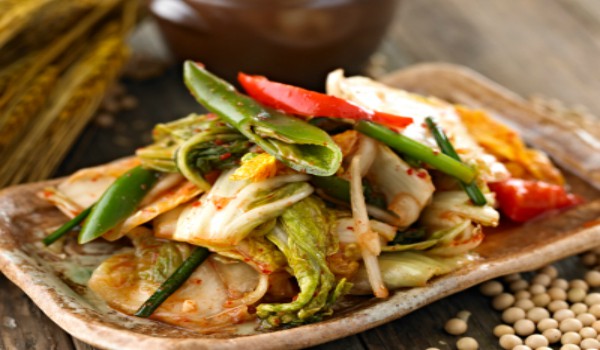Fermented foods are a staple in many cultures and are one of the oldest preservation methods. The earliest evidence of winemaking dates back to 8,000 years ago in the Caucasus area of Georgia. At one point in time, this preservation method was the only way that food could be stored for the long term.
Aside from the simplicity of fermentation, a variety of vegetables can be preserved with salt, water, and spices. So get creative! Sauerkraut is not the only fermented food you can make. Kimchi is a Korean dish made from fermented vegetables. Use any combination of the following vegetables to create beautiful, showy jars of easily preserved goodness.
- Beets
- Bell peppers
- Broccoli
- Cabbage
- Carrots
- Cauliflower
- Cucumbers
- Garlic
- Green beans
- Green onions
- Kale
- Onions
- Radishes
- Sprouts
- Turnip
- Horseradish root
Don’t stop at only fermenting foods, you can also make fermented drinks like kombucha and kefir. Bread like sourdough are also made from a fermented starter. The easiest that I have found is with using pineapple juice.
Sour Dough Starter
Step 1. Mix 3 ½ tbs. whole wheat flour with ¼ cup unsweetened pineapple juice. Cover and set aside for 48 hours at room temperature. Stir vigorously 2-3x/day. (“Unsweetened” in this case simply means no extra sugar added).
Step 2. Add to the above 2 tbs. whole wheat flour and 2 tbs. pineapple juice. Cover and set aside for a day or two. Stir vigorously 2-3x/day. You should see some activity of fermentation within 48 hours. If you don’t, you may want to toss this and start over (or go buy some!)
Step 3. Add to the above 5 ¼ tbs. whole wheat flour and 3 tbs. purified water. Cover and set aside for 24 hours.
Step 4. Add ½ cup whole wheat flour and 1/4 to 1/3 cup purified water. You should have a very healthy sourdough starter by now.

Still not convinced? There are many other health benefits of fermenting your food. The following are ways that fermented foods make your body systems work more efficiently.
Fermented foods have many health properties. Fermentation creates lactic acid, nature’s preservative. This promotes the growth of healthy bacteria in the human intestines. It also helps to break down proteins. The levels of popular probiotic bacteria (lactobacillus) are also increased in fermented foods.
Aids in digestion. Fermenting our foods is easier on our digestive tract because they are partially broken down. In fact, many of the gases that some foods tend to create are eliminated with fermented food. For instance, some people are lactose intolerant but are able to digest fermented dairy products like yogurt. This will help to alleviate common digestive ailments such as lactose intolerance, constipation, irritable bowel syndrome (IBS), yeast infections and some allergies.
Replenishes essential enzymes. Fermented foods also help to replenish enzymes which help us properly digest, absorb, and make full use of your food. According to the Food Renegade blog, “As you age, your body’s supply of enzymes decreases as well which has caused many scientists to hypothesize that if you could guard against enzyme depletion, you could live a longer, healthier life.”
Fermenting food increases vitamin content. Because of the folic acid present in fermented foods, this would be beneficial to expectant mothers. Vitamin B, riboflavin and biotin are also present.
Fermented foods assist in nutrient absorption. You can ingest huge amounts of nutrients, but unless you actually absorb them, they’re useless to you. When you improve digestion, you improve absorption. Introducing fermented foods to your system is an easy way to achieve this.
Fermenting foods is a versatile and inexpensive way to add tremendous amounts of nutrition to your diet. Start today to receive all of the benefits it possesses.




